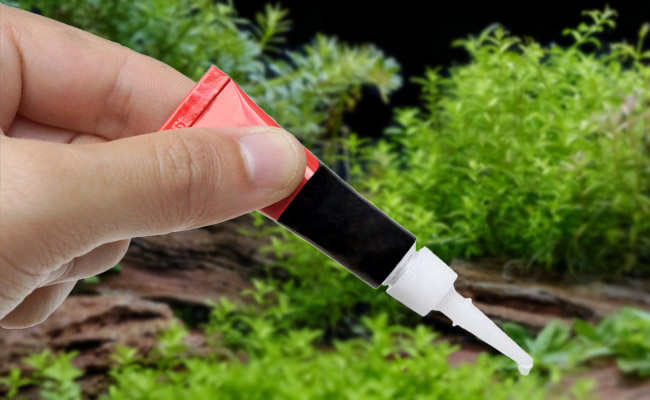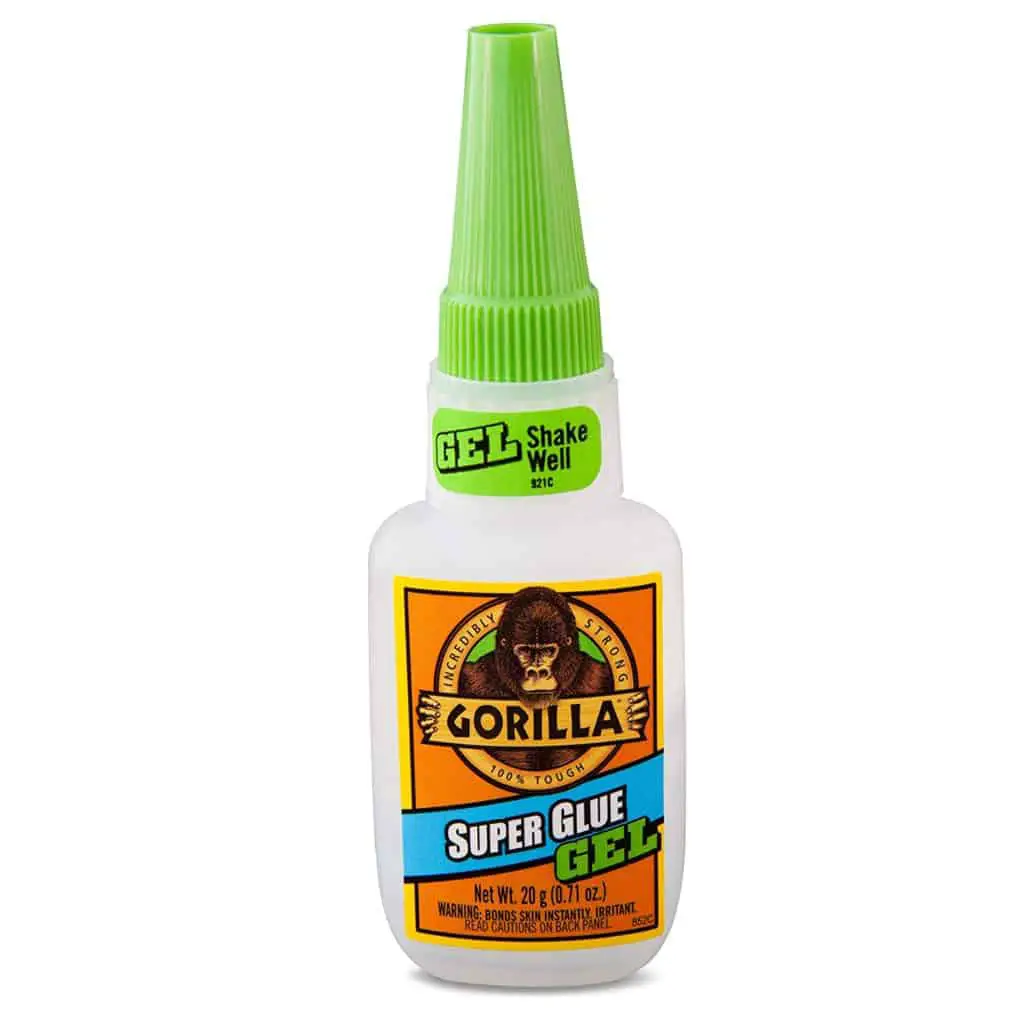Aquarium safe glue is any type of glue that won’t introduce toxins or bacteria into the tank water that can harm fish and other aquatic life.
The best options are silicone sealants, epoxy resin-based glues, PVC pipe cement, cyanoacrylate (superglue) formulations specifically made for aquariums and polyurethane adhesives.
It’s safest to avoid glues containing toxic solvents like acetone or propylene glycol as these chemicals can be fatal if ingested by fish or invertebrates.
It’s also important to make sure the ingredients in your chosen adhesive are not harmful to aquatic plants or corals before using them on an aquarium.
When building or repairing an aquarium, it is important to use the right type of glue for the job.
Regular craft glues may not be safe for use in aquariums as they can degrade over time and release chemicals into the water that could harm your fish.
Instead, look for a waterproof silicone sealant designed specifically for use in aquariums; this will provide a secure bond while also being non-toxic and safe for aquatic life.

Credit: fishlab.com
Types of Aquarium-Safe Glue
Silicone Adhesive
Silicone adhesive is one of the most popular choices for aquarium enthusiasts due to its versatility and safety.
It is a non-toxic adhesive that forms a strong bond and is resistant to water, making it ideal for various applications such as sealing leaks, attaching decorations, and repairing aquariums.
Silicone adhesive is available in both clear and black varieties, allowing for seamless integration with the aquarium’s aesthetics.
Cyanoacrylate (Super Glue)
Cyanoacrylate, commonly known as super glue, is another suitable option for aquarium use.
It is a fast-drying adhesive that forms a strong bond between different materials.
However, not all cyanoacrylate glues are safe for aquariums, as some may contain additives or solvents that can be harmful to aquatic life.
It is crucial to choose a cyanoacrylate glue explicitly labeled as aquarium-safe, ensuring it is free from toxic substances.
Epoxy Resin
Epoxy resin is a versatile adhesive that can be used in aquariums for various applications, including bonding rocks, attaching corals, and securing equipment.
It forms a strong and durable bond, resistant to water, and is non-toxic when cured.
However, it is essential to select an epoxy resin specifically designed for aquarium use, as some commercial epoxy products may contain harmful additives.
Polyurethane Adhesive
Polyurethane adhesive is another option to consider for aquarium repairs and constructions.
It is a waterproof adhesive that provides excellent bonding strength and is resistant to chemicals.
However, not all polyurethane adhesives are safe for aquarium use, as some may contain harmful additives.
It is crucial to select a polyurethane adhesive that is explicitly labeled as aquarium-safe.
Aquarium-Safe Sealants
In addition to glues, aquarium-safe sealants play a vital role in maintaining the integrity of an aquarium.
These sealants are specifically formulated to create a watertight barrier, preventing leaks and ensuring the safety of the aquatic inhabitants.
It is essential to choose a sealant that is free from toxic substances and compatible with the materials used in the aquarium’s construction.
What is the Best Glue for Aquarium Rocks?
When it comes to finding the best glue for aquarium rocks, there is no one-size-fits-all solution.
Depending on your specific needs and the materials you are working with, different types of glues may work better than others.
Generally speaking, silicone sealant and epoxy adhesive are two of the most popular choices when it comes to securing aquarium rocks in place.
Silicone sealant can be used to bond both porous and nonporous surfaces together, so it’s a great all around choice for any type of rock or other material that needs to be glued down.
Epoxy adhesives generally provide a stronger hold than silicone sealants but they may require additional surface preparation before they can be applied properly.
Both products offer waterproof protection which is essential if you want your aquarium decorations to stay safe from water damage over time.
Both silicone sealants and epoxy adhesives come in various forms such as liquid or gel which allow you to customize your application depending on what works best for your project at hand.
Is Normal Super Glue Safe for Aquariums?
It is important to know if normal super glue is safe for aquariums before you consider using it.
Normal super glue, also known as cyanoacrylate adhesive, can be used in some cases to mend small fractures and leaks in a glass aquarium.
However, there are several factors that must be taken into account when deciding whether this type of adhesive is appropriate.
For instance, the quality of the material being glued together needs to be considered; super glue works best on smooth surfaces like glass or porcelain but may not adhere properly on materials with rougher textures such as silicone sealant or plastic components.
One should take caution when applying any kind of liquid adhesive near an aquatic environment; fumes from curing adhesives can cause harm to fish and other aquatic creatures inside the tank.
While normal super glue can have its uses in repairing minor issues with an aquarium’s structure it may not always suitable depending upon the situation at hand so it’s best to err on the side of caution and avoid using this product altogether whenever possible.
Aquarium Safe Glue for Plants
Aquarium safe glue is a great way to secure plants in your aquarium. It is specifically designed for use underwater and won’t harm any fish or other aquatic life.
This type of glue will help keep the plants in place, while still allowing them to move around with the flow of water.
It won’t affect the quality of your aquarium’s water and can easily be removed if needed.
Aquarium safe glues are an effective and worry-free way to add some greenery to your tank!
Aquarium Safe Glue for Wood
Aquarium safe glue is an essential tool for any aquarium hobbyist looking to build and maintain a wood structure in their tank.
This type of glue does not contain toxic chemicals that can harm fish, plants, or other inhabitants of the aquarium.
It is waterproof, so it will hold up against water conditions and high humidity levels in the tank.
Aquarium safe glues are formulated to be non-toxic and biodegradable when exposed to bacteria in the water over time.
Aquarium Safe Glue for Plastic
Aquarium safe glue for plastic can be a great addition to any fish tank. This kind of glue is designed to bond with plastic and other materials, while at the same time being non-toxic and aquarium safe.
It’s great for repairs in tanks or decorations that require gluing, and it won’t harm your fish or contaminate their environment.
The best aquarium safe glues are waterproof, temperature resistant, and have strong adhesion properties so they last longer than regular craft glues.
Aquarium Safe Glue for Decor
Aquarium safe glue is an important tool for aquarium owners looking to decorate their tanks.
It’s designed to bond decorations without releasing toxins or chemicals into the water, which can harm fish and other aquatic life.
Aquarium safe glue comes in a variety of forms including silicone-based glues, gel adhesives, and epoxies.
Most are non-toxic, so they won’t negatively impact your tank inhabitants. Because it’s designed for use with aquariums specifically, it is waterproof and will not break down when exposed to the water conditions within the tank.
Best Glue for Aquarium Glass
Finding the best glue for aquarium glass can be a daunting task, as it needs to provide an adequate bond that will hold up against water pressure and temperature fluctuations.
Silicone sealant is widely accepted as one of the strongest adhesives for use on aquariums, due to its strong waterproof bonding abilities.
Silicone sealants are usually safe for aquatic life and do not release any harmful chemicals or fumes into your tank’s environment.
Conclusion
Selecting the right glue for aquariums is essential for maintaining the safety and integrity of the aquatic environment.
Silicone adhesive, cyanoacrylate (super glue), epoxy resin, and polyurethane adhesive are among the suitable options available.
It is crucial to choose glues that are explicitly labeled as aquarium-safe and free from toxic substances.
Considering aquarium-safe sealants for maintaining the watertight integrity of the aquarium is equally important.
By using the appropriate glues and sealants, aquarium enthusiasts can ensure the longevity and well-being of their aquatic inhabitants.
